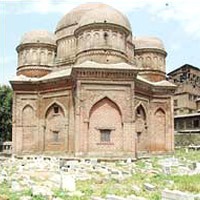Muslims practiced and patronized the Indo-Muslim medicine popularly known as Yunani Tibb. Zia-ud-din Barani in his historical accounts mentions the names of important physicians of the time of Balban and Ala-ud-din Khalji. The most prominent among them were Maulana Badr-ud-din and Maulana Hamid Mutris, both from Damascus. They were teachers as well as practicing physicians. Barani also mentions Hindu physicians like Man Ghandra and Raja, the surgeon. Avicenna’s al-Qanun was an important text on medicine, as it had been throughout European medical colleges, in the entire sultanate era.
Works on Medicine
Important works on medicine were written under the royal patronage. Muslim writers and practitioners drew upon both the foreign and indigenous sources. The earliest existing work on medicine was Majmu’ah-i-Zia’i written by Zia Muhammad during the reign of Muhammad Tughluq. Important books like the Tibb-i-Firuz Shahi and Rahat-ul-Insan were dedicated to Firuz Tughluq who built many hospitals for the public. In Kashmir, books on medicine entitled Kifayah-i-Mujahidiya and Tashrih-i-Mansuri were composed during the reign of Sultan Zain-ul-Abidin. During the reign of Sikandar Lodhi Tibb-i-Sikandari was written by his wazir, Mian Buhwah who was at liberty to draw on the works of ancient Hindu authors. This book remained the standard text book on medicine in the sub-continent for a long time.
This article was last updated on Monday, Jan 03, 2005



